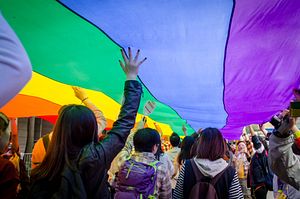In Hong Kong, a gay widower taking the government to court over the right to be recognized as his late husband’s spouse is sparking discussions over the city’s antiquated approach to gender.
Following the death of his husband Edgar Ng, Henry Li was reportedly prevented from identifying and collecting his spouse’s body for funerary arrangements, as well as handling other administrative matters, because their marriage in London was not recognized in Hong Kong.
Ng, who took his own life in December, was well known in the LGBTQ+ community for launching two legal bids against the government to advocate for more rights for same-sex couples last year.
One was a judicial review of the city’s inheritance laws, which Ng applied for after learning that the home he had bought could not be passed down to Li without a will. The bid led to a successful judgment by Hong Kong’s High Court in September, which ruled that same-sex couples should enjoy equal rights under local laws on intestacy and financial provision for dependents. The city’s justice department has since lodged an appeal.
Another was a legal challenge against a Housing Authority rule that prevented Ng from living with Li in a government-subsidized apartment. A hearing is scheduled to take place on April 19.
Before taking his own life at home, Ng, who suffered from depression, sent a final WhatsApp message to Li, asking him to scatter his ashes into the sea. Yet when Li went to a public mortuary to make arrangements, he was told by a government forensic pathologist that he needed authorization from Ng’s mother, as their marriage was not recognized.
While Ng’s mother gave Li authorization to deal with after-death arrangements, their relationship later deteriorated. Ng’s mother then reversed the decision and asked Li to return all of her late son’s possessions.
The case puts a spotlight on the broader movement fighting for LGBTQ+ rights in Hong Kong, which has in recent years won several victories. Last March, the High Court ruled that married same-sex couples should be allowed to apply for public housing. In 2018, the city’s top court also made a landmark judgment granting spousal visas to same-sex couples.
Yet there’s still a long way to go. There are currently no legal protections against discrimination on the grounds of sexual orientation and gender identity, making it difficult to tackle cases of harassment, particularly in schools and workplaces.
“Many of us are living in great stress, without support, sometimes in conflict. We hope the government can take action to implement the anti-discrimination law and marital law for same-sex marriage and related benefits, so [Li and Ng] and others do not have to take actions personally to fight the whole system,” said Alvin Cheung, a gay activist and freelance social worker. “It’s stressful and time consuming, and [there’s] the financial cost. The government is also using taxpayer’s money to fight the case. It’s a lose-lose situation.”
Advocates have also been campaigning for a gender recognition scheme that would allow transgender people to legally self-declare and amend their gender. At present, transgender people are required to undergo sex reassignment surgery in order to legally change their gender status.
Despite the veneer of a vibrant gay scene and Hong Kong’s reputation as a cosmopolitan city, the city remains relatively conservative on gender issues, and there is widespread stigma against the LGBTQ+ community in all spheres of society.
Many community members are vulnerable to depression and other mental health issues, which have been exacerbated by the pandemic, activists say.
According to Jerome Yau, CEO of Pink Alliance, a local non-profit advocating for LGBTQ+ rights, one of the main obstacles to advocacy in Hong Kong are faith-based organizations that take conservative approaches to gender. It’s a challenge activists do not face in mainland China, where society is relatively secular, Yau said.
“In Hong Kong, there’s vocal opposition from faith-based communities. The colonial period brought these values to Hong Kong,” said Yau, who is also co-founder of Hong Kong Marriage Equality. “The curriculum pertaining to sex education hasn’t been changed for two decades. But schools have a bit of leeway, and some schools are better than others.”
Although homosexuality has been decriminalized for almost three decades, conversion therapy is still not formally banned in the city, said Cheung, who is a survivor of conversion therapy. In recent years, there have been reports of such programs being discreetly offered by conservative Christian groups and other organizations.
Yet public attitudes are slowly shifting. A study last year by the Chinese University of Hong Kong found that 60 percent of 1,058 people polled believed there should be laws against discrimination based on sexual orientation, up from the 56 percent recorded in a similar survey by the Equal Opportunities Commission and the university in 2016.
“People have a better awareness these days,” Yau said. “The path to equality is never easy. This is not unique to Hong Kong. I think most people will come to their senses and think: yes, it’s wrong not to treat people with dignity and respect.”

































